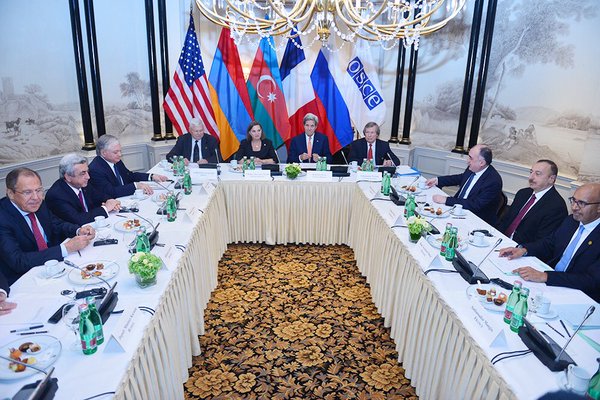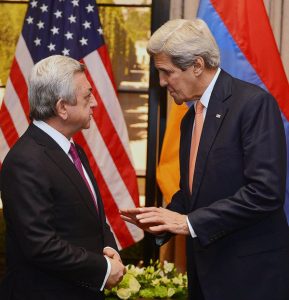Hamparian Comments Following Sarkisian-Aliyev Meeting on NKR Peace
May 17, 2016Armenia and Azerbaijan Presidents Agree to Ceasefire Monitoring Mechanisms; Expanded OSCE Minsk Group Role, at Vienna Meeting Brokered by Top US, Russian, and French Diplomats
WASHINGTON—Armenian National Committee of America (ANCA) Executive Director Aram Hamparian offered these comments following the May 16 Vienna meeting between Armenian President Serge Sarkisian, Azerbaijani President Ilham Aliyev, and top diplomats from U.S., France, and Russia regarding Nagorno-Karabagh peace.

U.S. Secretary of State John Kerry, Russia Foreign Minister Sergei Lavrov, and France State Secretary for European Affairs Harlem Desir with Armenian President Serge Sarkisian and Azerbaijani President Ilham Aliyev during discussions of NKR peace on May 16, in Vienna, Austria
“Reports from today’s meeting between President Sarkisian and President Aliyev calling for mechanisms to monitor the Nagorno-Karabagh ceasefire and increase the OSCE Minsk Group observer presence in the region represent promising early indications that the international community, after far too many years of appeasing Baku, may be willing to take meaningful steps to confront and constrain Azerbaijan’s escalating aggression against both Artsakh and Armenia.”
“The key, of course, is in the implementation of these understandings—and, to that end, a willingness by the OSCE Minsk Group and the international community to clearly and unequivocally condemn Azerbaijan’s obstruction of these confidence building measures. The OSCE’s counter-productive pattern of artificial even-handedness in the face of Azerbaijan’s ongoing ceasefire violations and escalation of violence has only served to embolden President Aliyev’s march toward war. We hope that this failed policy of false parity will finally be put to an end with this Vienna meeting.”

U.S. Secretary of State Kerry meeting with Armenian President Serge Sarkisian on May 16, in Vienna, Austria
According to a statement issued late Monday evening by U.S. Secretary of State John Kerry, Russia Foreign Minister Sergei Lavrov, and France State Secretary for European Affairs Harlem Desir, President Sarkisian and President Aliyev “reiterated their commitment to the ceasefire and the peaceful settlement of the conflict. To reduce the risk of further violence, they agreed to finalize in the shortest possible time an OSCE investigative mechanism. The Presidents also agreed to the expansion of the existing Office of the Personal Representative of the OSCE Chairperson in Office. Finally, they agreed to continue the exchange of data on missing persons under the auspices of the ICRC, to which the Presidents committed during the Paris summit of October 2014.”
The statement went on to note that “the Presidents agreed on a next round of talks, to be held in June at a place to be mutually agreed, with an aim to resuming negotiations on a comprehensive settlement.”
International calls for a concrete ceasefire oversight mechanism are not new. Since October 2015, more than 90 members of the U.S. Congress have stated their support for the Royce-Engel peace proposals—initiated by House Foreign Affairs Committee Chairman Ed Royce (R-Calif.) and Ranking Democrat Eliot Engel (D-N.Y.)—which call for the placement of gun-fire locators to clearly identify ceasefire violators on the Karabagh borders, in addition to the removal of snipers and heavy weaponry, and the deployment of additional OSCE monitors. Armenia and Karabagh had both agreed to the common-sense measures; Azerbaijan had refused to date.
Prior to the Vienna meeting, the ANCA’s Hamparian cautioned against any one-sided concessions in the face of ongoing Azerbaijani aggression. “Everything we have seen in the 45 days since Azerbaijan launched its April 2nd offensive confirms that Ilham Aliyev is hell-bent on conquest, that he’ll only leverage concessions by Nagorno-Karabagh to intensify his attacks, and that the OSCE, the international community, and—sadly—our own U.S. government are all unable or unwilling to confront ongoing Azerbaijani ceasefire violations that continue to claim lives on all sides,” said Hamparian. “Given Azerbaijan’s track record of escalating violence, we remain profoundly opposed to one-sided deals that require Nagorno-Karabagh to make up-front, strategic, and irrevocable security concessions in return for deferred, vague, and reversible Azerbaijani promises regarding Artsakh’s future status.”
On April 2, Azerbaijan launched a 4-day war against Karabagh, resulting in the death of some 100 Armenian civilians and defense fighters and reports of over 250 Azerbaijani military casualties. The ANCA has called for a “Leahy Law” investigation into reports of Azerbaijani war crimes, including the murder of an elderly couple in the northern Nagorno-Karabagh village of Talish and the beheading of several Armenian defense fighters. First introduced in 1997, the “Leahy Law” prohibits the U.S. Department of State and Department of Defense from providing military assistance to foreign military units that violate human rights with impunity. In keeping with core American values, these laws help ensure that our U.S. tax dollars are not used by units or individuals of foreign armed units or security forces to commit human rights abuses and war crimes.
The ANCA has also called for expanded U.S. assistance to Nagorno-Karabagh to address the humanitarian needs resulting from Azerbaijani aggression and the zeroing out of all military assistance to Azerbaijan in the face of ongoing violence.
Source: Armenian Weekly
Link: Hamparian Comments Following Sarkisian-Aliyev Meeting on NKR Peace